Army Today
The General in a Sari
- Details
- Created: 12 October 2006
- Written by Archana Masih and Jewella C Miranda
- Hits: 17562
Lieutenant General Punita Arora was appointed as DG-Medical Services (Navy) on 20 June 2005 and presently holds the rank of Vice Admiral.
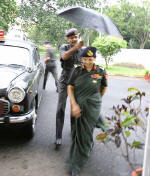
1730 Hours
With a precision that comes most naturally to the armed forces, a gleaming black army Ambassador pulls into the driveway of the VIP guesthouse at the Armed Forces Medical College in Pune. Dot on time. A uniformed trooper runs to the rear door with an open umbrella to shield the officer who steps out. Dressed in the Indian Army's olive green uniform, the officer pulls the pleats of her sari and walks up. Don't know how many of you have seen an officer of the Indian Army dressed in a sari. For us, it is a first time. And when the officer is the first woman to attain the rank of Lieutenant General of the world's fourth largest army, well, what can you say? Wow! Amazing! Yes! Lieutenant General Punita Arora is a warm, friendly officer who refers to the Indian Army as "us, ours" -- as if it were an extension of her personality -- and is bemused with all the fuss surrounding her in the last two weeks. "If my fellow male officer picks up a rank, he also feels great isn't it? I'm sure even they feel very proud, I also felt the same way," she explains. "I never felt that I am a woman and I've reached this position, so I've done something very great."
A Refugee from Partition
Lieutenant General Arora arrived in India after Partition when she was a year old. The only possessions her family had when they reached India were a blanket and a glass. Like the one million others who left their homes for a hard and uncertain future in a land they chose to live in after Independence, her family saw tough times. They started from scratch, made many sacrifices along the way and built their lives brick by brick. "A very strong point they had was unity of the family. If one working member got some money it was shared equally. My father was the eldest. His brother who expired just a year back at the age of 95, looked up to my father till the end," she says.
Sitting across in her living room, the general gives charming, everyday examples of the beauty of Indian family from her own life. Of the time her mother accompanied her on her first posting to Fatehgarh, Uttar Pradesh in 1968. How her younger sisters, mother-in-law took turns in being with her on various postings; and that one time when her 75-year-old Nani came to live with her only because she did not want her grand-daughter to be alone. "Our family system is so beautiful. If we disintegrate like nuclear families we are losing a lot. Today what I am I wouldn't be without the support of my family," says the officer whose husband retired as a Brigadier from the Army Medical Corps.

Captain Dinesh Bhardwaj Singh
As far back as Lieutenant General Arora can remember, her father wanted her to become a doctor. "At every step I used to think if I want to be a doctor can I get my ears pierced or not? I was conditioned that way." When she went for admission to the government college in Saharanpur, the college told her it was only for boys but she could get a seat if she found two other girls. She did and got admission. She joined the Armed Forces Medical College, Pune, as an undergraduate in 1962, did her post graduation, came back as faculty, was posted to its command hospital and has now returned for its top job as commandant.

"I've seen this college from every angle. I know its strengths and certain areas which I felt at that time, that it should be like this (changes to be made). Now that I am here if I can improve on those particular things I consider myself very privileged." In those early days, when she joined AFMC -- one of India's premier medical colleges -- it did not have the required infrastructure. "We never had a hostel, we were 23 girls in one barrack. There were so many departments that were in barracks but everything was compensated by the excellent teaching and care we got."
The Posting in the Wild
Twenty-one year old Lieutenant Punita Arora arrived in Fatehgarh after doing an internship in Ambala. Till then she had lived in reasonably big cities and found herself in what was the bad land of that time. "In 1968, Fatehgarh was infested with dacoits. I'd never seen a place like that before. Everybody roamed with a lathi or a gun." At the hospital, people mistook her mother who was comparatively young, as the doctor sahib and thought of her as the daughter accompanying her. In hindsight, Lieutenant General Arora feels it could not have had a better beginning. The area did not have many hospitals, no specialists and the nearest big hospital was in Kanpur or Lucknow, four to six hours away. The only train in that direction left at midnight. "If the patient missed the train you'd have to look after him/her yourself. So that gave me lots of confidence. It was a good tenure."
The 1971 War
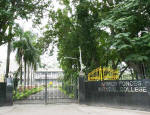
When the war with Pakistan broke out, she was still posted in Fatehgarh and had married her doctor husband who was at the base hospital in Srinagar. She had come to the scenic city to deliver her son -- currently a Squadron Leader in the Indian Air Force -- and left a month before the war began. Her husband who used to be on airport duty witnessed the bombardment, and Punita saw the war preparations in Jammu & Kashmir, where the situation was completely different from her base in Uttar Pradesh. "Fatehgarh never saw any war. People hardly knew what was happening. Like sitting over here, I'm sure you can't even imagine what's happening up there [in J&K]. If you go and spend even 15 days over there, you'll come back with a totally different feeling."
The Summer Tragedy
In May 2002, when terrorists entered an army camp at Kaluchak near Jammu, killing soldiers and their families, Lieutenant General Arora was the commander at the base hospital in Jammu. The crime was dastardly. Terrorists travelled to the camp in a Himachal Pradesh Roadways bus and targeted the soldiers' wives and children. They also killed seven passengers on that bus. Some who died in the tragedy were infants. The dead and wounded were brought to the army hospital where Lieutenant General Arora rallied her staff to administer prompt medical assistance. For her leadership and quick response to the mass casualty, the President of India decorated her with the Vishisht Seva Medal, an award instituted for exceptional service and leadership rendered in the armed forces. "It was very tragic. Our aim was to treat them. My driver, my staff in the casualty, my doctors, surgeons, anaesthetists, nurses. It was team work."
Did it make Her Angry?

"Do we gain anything by being angry? Yes, when you see your soldiers being killed, for a moment we thought we should go and kill everyone who is responsible. Not only me, anybody who is there would say -- 'why, these innocent children, why this family?' Like you feel angry with what happened in the school in Russia. But then those three terrorists died, whom do I take out our anger on? Probably I'll be losing my temper on some innocent people. These things need to be sorted out politically which are leaders are doing so beautifully. We leave it to them. Our job is to secure our borders and treat our soldiers."
Here I Am
Lieutenant General Arora has received 15 medals and awards in her career. She also received a Sena Medal for establishing gynae-endoscopy and oncology facilities at the armed forces hospital. Joining the army just happened, she says. "I joined AFMC, then the army, and here I am today -- proud of being an army officer and that too of the Indian Armed Forces." For an army that is short of officers, Lieutenant General Arora is an impressive brand ambassador. Listen to her speak, and she may just win you over.
"Guys, this is what you miss out on: First of all, the youth don't know what the armed forces is. I think they miss out on so much because they really don't know. Secondly, people think you will be posted from one place to another and will not have a comfortable life from the money point of view. After all, how much money do we spend on food? What we spend on is the quality of life -- a club, squash court, a pool, good life -- the army gives you better than that. We have infrastructure -- lovely messes, swimming pools, health clubs. How many can afford going to Shillong or Ladakh? They'll be paying through their nose, people take holiday packages and spend money to live in tents. While we naturally stay like this over there, isn't it?. The armed forces gives you 100% free medical treatment. So the quality of life is excellent."
Captain Dinesh Bhardwaj Singh
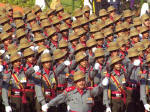
As far back as Lieutenant General Arora can remember, her father wanted her to become a doctor. "At every step I used to think if I want to be a doctor can I get my ears pierced or not? I was conditioned that way." When she went for admission to the government college in Saharanpur, the college told her it was only for boys but she could get a seat if she found two other girls. She did and got admission. She joined the Armed Forces Medical College, Pune, as an undergraduate in 1962, did her post graduation, came back as faculty, was posted to its command hospital and has now returned for its top job as commandant.
Five Doctors and a General
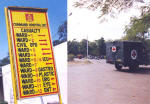
The gynaecologist, who is one of the seven lieutenant generals in the Army Medical Corps, has a family of doctors. Husband Brigadier P N Arora (Retd) served the army as a dermatologist. Son, Squadron Leader Sandeep Arora is also a dermatologist posted at the Air Force base hospital in New Delhi. His wife too is a doctor. Daughter Sabina left the army after a 6½ year tenure to pursue a post graduate degree in Connecticut. "When my daughter wanted to go abroad, we didn't know how to go about it. We had nobody in America. We told her you have a good career but she was determined. She did everything herself and I'm proud of her."
Lieutenant General Arora's India
In a time when it is easiest to find fault in a system that fails us repeatedly, the general sees the brighter side. Her India does not suck. It delivers. Whether it is getting a train reservation, a car registration, or State-promised compensation. "How much we criticise," she reasons, citing the example from the passengers on the Himachal Roadways bus travelling to Kaluchak. "Believe me, by afternoon payment was made to each and every person who was injured. People think otherwise, but the government machinery works. One patient who received Rs 25,000 was a labourer who had never seen more than 2,000 in his life. He became so insecure that he wanted to leave with all the tubes stuck to his body. He was scared that someone would run away with his money. He even became suspicious of his wife. Think about it, do we ever get to see human nature, feelings from so closely?"
Lieutenant General Punita Arora, SM, VSM
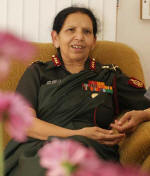
If you are driving near the Southern Command headquarters in Pune, the board outside the gate to what will be Lieutenant General Arora's home in the city will make you stop and notice. The feminine name stands out amongst the neat row of male officers' homes. The house behind the gate is being readied for its new occupant. Till then, Lieutenant General Arora will live at the guesthouse, where she leaves for her office at 8:15 a.m. and returns by 5 p.m. "The moment I come home, I have a cup of tea and go for a walk. That's a must. I don't like to exercise inside the room at all -- where's the greenery? On a walk you see a little bird, a squirrel, in the room you see only those four walls, nothing else."
Just then the phone rings. The general takes our permission to answer the call and thanks her bhabhi who is on the line to congratulate her. A few cards neatly stand on a table. A defence staff reminds her about tomorrow's keynote address. "I know, that will not take much time," smiles India's first lady Lieutenant General, someone who has never felt out of place in a male dominated army. She is an officer of the Indian Army and that's how she'd like to be known.
Rediff.Com - September 2004